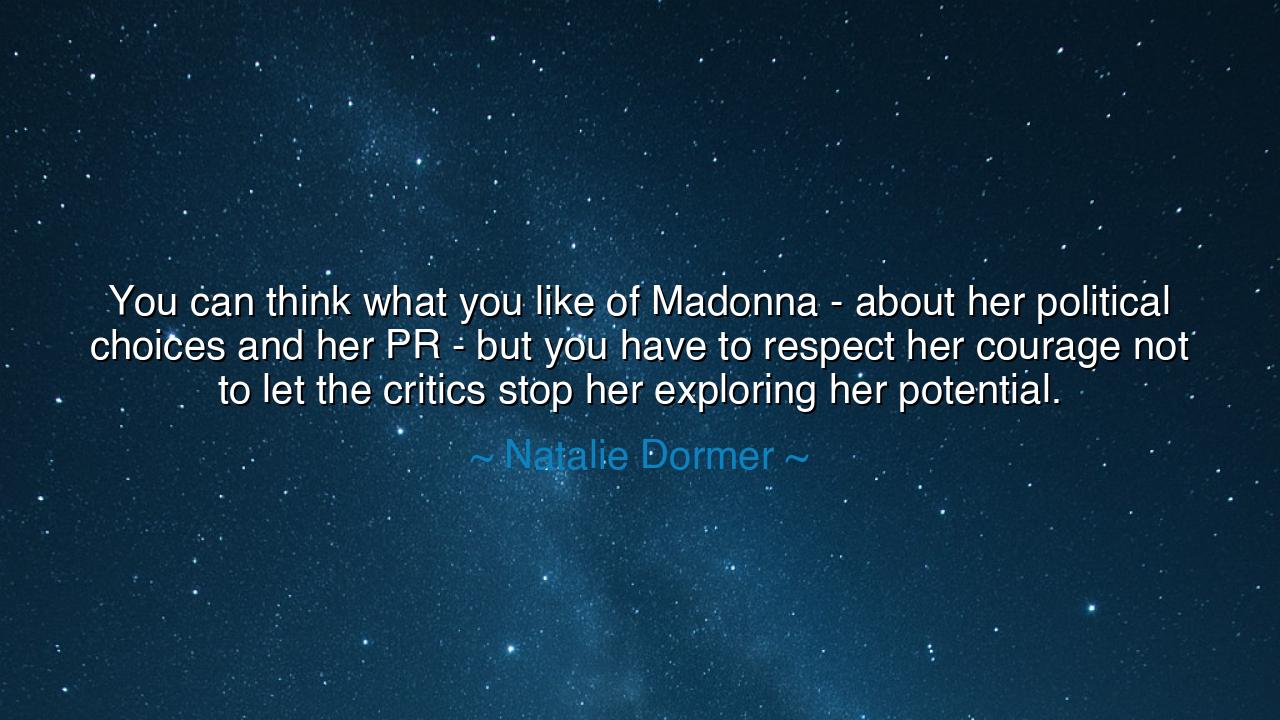
You can think what you like of Madonna - about her political
You can think what you like of Madonna - about her political choices and her PR - but you have to respect her courage not to let the critics stop her exploring her potential.






In the words of Natalie Dormer, actress and observer of human spirit, there lies a profound tribute to the courage of creation: “You can think what you like of Madonna — about her political choices and her PR — but you have to respect her courage not to let the critics stop her exploring her potential.” This quote, simple yet powerful, speaks not merely of a single artist, but of the eternal struggle faced by every soul who dares to live boldly, to stretch beyond the confines of judgment, and to follow the voice within rather than the noise without. Dormer’s words are both a defense of authenticity and a hymn to courage — the sacred fire that keeps the artist, the thinker, and the dreamer alive amid storms of scorn.
The origin of this quote lies in admiration — admiration not for perfection, but for perseverance. Madonna, one of the most enduring figures in modern culture, has been both praised and condemned in equal measure. Her art, her reinventions, her statements — all have stirred admiration and outrage. Yet what Dormer honors is not Madonna’s fame, but her fearlessness. In a world eager to dictate who we should be, Madonna’s refusal to bow before critics becomes a symbol of inner sovereignty. She has stumbled, she has provoked, but she has always continued — a testament to the idea that greatness belongs not to those who never err, but to those who refuse to be silenced by failure or ridicule.
Throughout history, the critic’s voice has always shadowed the voice of the creator. From the philosophers of Athens to the poets of Rome, from the painters of Florence to the scientists of the Enlightenment — all who dared to step beyond convention met resistance. Think of Galileo, who looked to the heavens and saw truth that defied doctrine. The world scorned him, silenced him, confined him. Yet centuries later, it was his courage — his refusal to submit to the comfort of acceptance — that illuminated the path for generations of seekers. So too, Dormer reminds us, must we honor those who dare to explore their potential, even when others call them heretics of art or arrogance of ambition.
The heart of Dormer’s quote lies in one word — respect. For to respect is not always to agree; it is to acknowledge the nobility of effort, the integrity of striving. The critics of the world often see only outcomes — the finished song, the painted canvas, the public act — and from their safe distance they judge. But they do not see the inner war: the doubt that gnaws, the fear of being misunderstood, the exhaustion of defending one’s purpose. To persist in creation, despite those unseen battles, is to practice a form of heroism as ancient as time itself. Respect, therefore, is owed not to the success of the artist, but to their unbroken will to create.
Dormer’s reflection calls upon us to examine our own lives. How often have we shrunk our potential for fear of being mocked? How often have we hidden our light beneath the cloak of conformity, afraid that our boldness would offend the small-minded? The example of Madonna, as Dormer presents it, is a mirror held to our timidity. It whispers: “Dare.” For the critics will always speak — it is their nature — but it is the daring who build the world anew. Those who wait for permission from others will live forever in the shadow of those who did not.
Consider the Renaissance, that age of awakening when artists and thinkers defied tradition to birth beauty and knowledge anew. Michelangelo, scorned for his pride, carved divinity from stone; da Vinci, mocked for his eccentricity, envisioned flight and anatomy centuries ahead of his time. Like Madonna in the modern world, they did not seek approval — they sought truth through expression. The world resisted them, but it is their light that still burns, while the voices of their critics have turned to dust. Dormer’s words remind us that the critic’s fire dies quickly, but the creator’s flame, if tended bravely, becomes eternal.
So, my children, let this be your lesson: be courageous in your becoming. The world will judge, but judgment cannot destroy those who are faithful to their purpose. Do not fear the critic — fear only the silence that comes from self-betrayal. Respect yourself enough to try, to fail, to rise, to create again. For the measure of a life is not how often it pleases the crowd, but how deeply it fulfills the calling of the soul.
In the end, as Natalie Dormer teaches through her reflection on Madonna, greatness is not perfection — it is persistence. It is the divine stubbornness to explore one’s potential, to keep walking the path of creation even when the stones of mockery are cast from both sides. Respect, therefore, is not given for living without fault, but for living without fear. And those who dare, as Madonna has dared, will one day stand not merely as artists, but as symbols of what it means to live authentically and unafraid — a lesson for all who seek to become more than what the world permits them to be.






AAdministratorAdministrator
Welcome, honored guests. Please leave a comment, we will respond soon